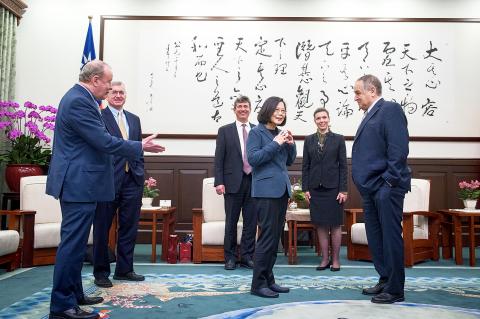The government has made its stance on China’s unilateral activation of northbound flights on aviation route M503 known to the International Civil Aviation Organization (ICAO) personally and via several diplomatic allies, but has yet to receive a response, a government source with knowledge of the matter said.
The source, who spoke on condition of anonymity because they were not authorized to discuss the issue, said Beijing was required by ICAO regulations to coordinate with affected parties before launching new routes, but it failed to do so before unilaterally activating northbound flights on M503 and three new extension routes — W121, W122 and W123 — along China’s southeast coast on Thursday last week.
Under Item 4.2.6 of the ICAO’s Air Traffic Services Planning Manual, changes to any route should be made only after it has been coordinated with all parties concerned.

Photo: CNA, courtesy of the Presidential Office
“The ICAO has been made aware of the matter... However, the organization is reluctant to intervene, but we still have to let our stance be known,” the source said, adding that as Taiwan is not a member of the UN agency on civil aviation matters, “our voice can hardly be heard.”
Asked whether the government planned to take further action, the source said that several ICAO member states friendly to Taiwan have spoken out in its favor, but declined to reveal whether he was referring to the US and Japan.
“We have also notified all our representative offices overseas to relay the government’s hope to other nations that their airlines refrain from using the controversial M503 route,” the source added.
Due to Chinese pressure, Taiwan has been excluded from the triennial ICAO assembly, except in 2013, when warmer cross-strait ties under then-president Ma Ying-jeou (馬英九) paved way for the nation’s attendance at the conference as a “guest.”
In January 2015, after receiving approval from the ICAO, China announced the activation of the M503 route — which, at its nearest point, is 7.8km from the Taiwan Strait’s median line — and the three extension routes, prompting protests from Taipei.
Following cross-strait negotiations an agreement was reached in March 2015 that China would only operate southbound flights on M503 and put the launch of the three extension routes on hold.
Ministry of Foreign Affairs spokesman Andrew Lee (李憲章) yesterday told a news conference in Taipei that as the matter pertains to aviation routes, the Ministry of Transportation and Communications was in close contact with the ICAO.
“As a news release issued after a national security meeting chaired by President Tsai Ing-wen (蔡英文) on Sunday stated, the foreign ministry should initiate international campaigns and engage with foreign governments to secure the support of other nations and win the battle for international public opinion,” Lee said. “We will continue with such efforts.”

SECURITY: As China is ‘reshaping’ Hong Kong’s population, Taiwan must raise the eligibility threshold for applications from Hong Kongers, Chiu Chui-cheng said When Hong Kong and Macau citizens apply for residency in Taiwan, it would be under a new category that includes a “national security observation period,” Mainland Affairs Council (MAC) Minister Chiu Chui-cheng (邱垂正) said yesterday. President William Lai (賴清德) on March 13 announced 17 strategies to counter China’s aggression toward Taiwan, including incorporating national security considerations into the review process for residency applications from Hong Kong and Macau citizens. The situation in Hong Kong is constantly changing, Chiu said to media yesterday on the sidelines of the Taipei Technology Run hosted by the Taipei Neihu Technology Park Development Association. With

CARROT AND STICK: While unrelenting in its military threats, China attracted nearly 40,000 Taiwanese to over 400 business events last year Nearly 40,000 Taiwanese last year joined industry events in China, such as conferences and trade fairs, supported by the Chinese government, a study showed yesterday, as Beijing ramps up a charm offensive toward Taipei alongside military pressure. China has long taken a carrot-and-stick approach to Taiwan, threatening it with the prospect of military action while reaching out to those it believes are amenable to Beijing’s point of view. Taiwanese security officials are wary of what they see as Beijing’s influence campaigns to sway public opinion after Taipei and Beijing gradually resumed travel links halted by the COVID-19 pandemic, but the scale of

A US Marine Corps regiment equipped with Naval Strike Missiles (NSM) is set to participate in the upcoming Balikatan 25 exercise in the Luzon Strait, marking the system’s first-ever deployment in the Philippines. US and Philippine officials have separately confirmed that the Navy Marine Expeditionary Ship Interdiction System (NMESIS) — the mobile launch platform for the Naval Strike Missile — would take part in the joint exercise. The missiles are being deployed to “a strategic first island chain chokepoint” in the waters between Taiwan proper and the Philippines, US-based Naval News reported. “The Luzon Strait and Bashi Channel represent a critical access

Pope Francis is be laid to rest on Saturday after lying in state for three days in St Peter’s Basilica, where the faithful are expected to flock to pay their respects to history’s first Latin American pontiff. The cardinals met yesterday in the Vatican’s synod hall to chart the next steps before a conclave begins to choose Francis’ successor, as condolences poured in from around the world. According to current norms, the conclave must begin between May 5 and 10. The cardinals set the funeral for Saturday at 10am in St Peter’s Square, to be celebrated by the dean of the College